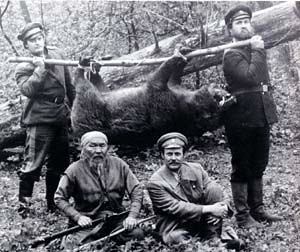← Back to Reviews
in

Dersu Uzala (1975)
Directed by Akira Kurosawa
Starring: Maksim Munzuk, Yuri Solomin
What is this movie about? You could say it's about man and nature. You could also say it's about friendship; what one man will do for another, and what he cannot do.
In the early 1900s, a group of Russian soldiers surveying the taiga in eastern Russia meet a hunter named Dersu Uzala, who becomes their guide. Although they make fun of him at first for his strange ways and manner of speech, they soon come to respect him as an expert tracker and learn from him a little more how to behave towards their fellow man. In particular, Dersu and the commander of the men form a fast friendship, and both regret the time when they must part, for Dersu refuses to return to town with the men.

Several years later the commander ("Capitan", as he is called by Dersu), leading another group of surveyors is reunited with Dersu Uzala. Again Dersu proves his value as a guide, but things change when he kills a tiger and becomes afraid for his life; that the forest spirit will take revenge on him. And sure enough, soon Dersu's eyesight begins to fail; one of the worst fates possible for a hunter. Reluctantly Dersu agrees to return to the city with the Captain, but he is unable to adapt, which leads to the film's tragic but inevitable conclusion.

With Dersu Uzala, Akira Kurosawa has created a quietly powerful film, filled with beauty, and touched with a gentle sadness throughout. Unlike Kurosawa's samurai epics, this film moves at a slower pace, told in a series of vignettes that demonstrate the innate goodness of Dersu Uzala and the effect that one man can have on his companions.
One of the most striking things about this film is the gorgeous cinematography. The beauty of the forest and the desolation of the tundra are given deft treatment by Kurosawa and his cinematographer Fyodor Dobranov. The musical score is sparse, with ambient sounds serving as the backdrop for much of the movie, or, particularly in one moving scene, the sound of the soldiers' singing. The film is slowly, I am tempted to say "organically" paced, with each scene or story unfolding as it should; never rushed or hurried along by an anxious director. It's a movie that clearly required patience to make, and it takes patience to watch. But as always, the payoff for patience can be immensely rewarding.
What is this movie about? Yes, you could say that it is about man and nature, or about the power of friendship and the limits of that power. But in the end this film is about Dersu Uzala. And that is enough.

Dersu Uzala (1975)
Directed by Akira Kurosawa
Starring: Maksim Munzuk, Yuri Solomin
What is this movie about? You could say it's about man and nature. You could also say it's about friendship; what one man will do for another, and what he cannot do.
In the early 1900s, a group of Russian soldiers surveying the taiga in eastern Russia meet a hunter named Dersu Uzala, who becomes their guide. Although they make fun of him at first for his strange ways and manner of speech, they soon come to respect him as an expert tracker and learn from him a little more how to behave towards their fellow man. In particular, Dersu and the commander of the men form a fast friendship, and both regret the time when they must part, for Dersu refuses to return to town with the men.

Several years later the commander ("Capitan", as he is called by Dersu), leading another group of surveyors is reunited with Dersu Uzala. Again Dersu proves his value as a guide, but things change when he kills a tiger and becomes afraid for his life; that the forest spirit will take revenge on him. And sure enough, soon Dersu's eyesight begins to fail; one of the worst fates possible for a hunter. Reluctantly Dersu agrees to return to the city with the Captain, but he is unable to adapt, which leads to the film's tragic but inevitable conclusion.

With Dersu Uzala, Akira Kurosawa has created a quietly powerful film, filled with beauty, and touched with a gentle sadness throughout. Unlike Kurosawa's samurai epics, this film moves at a slower pace, told in a series of vignettes that demonstrate the innate goodness of Dersu Uzala and the effect that one man can have on his companions.
One of the most striking things about this film is the gorgeous cinematography. The beauty of the forest and the desolation of the tundra are given deft treatment by Kurosawa and his cinematographer Fyodor Dobranov. The musical score is sparse, with ambient sounds serving as the backdrop for much of the movie, or, particularly in one moving scene, the sound of the soldiers' singing. The film is slowly, I am tempted to say "organically" paced, with each scene or story unfolding as it should; never rushed or hurried along by an anxious director. It's a movie that clearly required patience to make, and it takes patience to watch. But as always, the payoff for patience can be immensely rewarding.
What is this movie about? Yes, you could say that it is about man and nature, or about the power of friendship and the limits of that power. But in the end this film is about Dersu Uzala. And that is enough.
